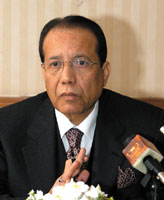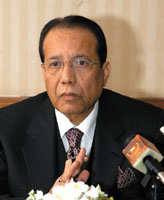
In the Conference on ‘Good Governance’ in JordanYemen commits to more reforms [Archives:2005/815/Front Page]
February 10 2005
 |
In his speech representing Yemen, Prime Minister Abdulqadir Ba Jammal asserted the commitment of Yemen reminding the delegates that it was Yemen who made the pioneer step of reforming laws and legislations during the period just before and after Yemen's unification in May 1990.
“The Yemeni experience in uniting two countries and reforming and rephrasing laws to cope with new era is indeed a unique experience in modern history. It is so because it represented a true public willingness that conformed to a historical political leadership represented by H.E. Ali Abdullah Saleh.” PM Ba Jammal said.
Even though the Prime Minister did not give specific obligations or described particular steps that would be taken in implementing the declaration of the conference, but he asserted Yemen's commitment to reforms that would help comprehensive development of the country.
In the conference which was inaugurated by H.H King Abdullah bin Hussein of Jordan, focused on six main themes that would require reform and extra focus to achieve good governance that would enhance developmental efforts in the Arab world. All of the six themes were of interest to the Yemeni delegation which was composed of legal experts, government officials, NGO representatives, and the Yemeni media.
Reform in specific areas
The commitment of Yemen and other countries is considered an obligation to start measures in the six areas that the final declaration announced:
1 – Judiciary reform, which includes training of judges, ensuring independence of judiciary and judges, computerization of the courts' operation and increasing judicial staff, etc. Yemen's Minister of Justice Adnan Al-Jifri, who attended the conference, had said that major judicial reforms are taking place in Yemen. He noted that his participation is a sign of the commitment to follow up the reforms and learn from experiences of other countries, including Jordan.
2 – Enhancing the role of civil society and the media in public sector reform. This will require the governments to facilitate the role of the civil society to help it ensure that reforms are being implemented by the state. It also implies that civil society and media would have to present ideas and projects that would allow them to help the government reform itself in the fields of e-government, public service delivery and governance of public finance respectively.
3 – Civil Service and integrity reforms, which focuses on reforms in structures, hierarchy, and civil service. It also emphasizes on integrity when dealing with citizens and establishing means to allow the public to report to authorities on cases of improper behavior in the public sector.
4- Transparency, e-governments, and facilitation of governmental procedures is achieved by educating and training public sector employees about the importance of transparency and allowing public access to information. Emphasis was made on the importance of access to information and use of the media and civil society to raise awareness of the rights of citizens to know.
5- Management of funds and resources was also a major topic during the conference and participant countries have this issue a great deal of importance and raised it more than once in the final declaration linking it to anti-corruption efforts and transparency in the public sector.
6- Public services management dealt with the issue of partnership between the public and private sector. It also focused on the importance of encouraging private investments by broadening the base of services offered and facilitating them.
By the end of the Dead Sea conference, Yemen and the other participant countries agreed on a “collective leadership” that will oversee the implementation of the projects adopted in the meeting.
So far, the UNDP provided most of the funding for the studies conducted, estimated at $15 million. Individual projects will be implemented by concerned countries with funding from various sources.
“The Arab world does not lack money for projects,” Jordanian Justice Minister Salah Bashir told reporters.
“What countries need is institutional potential to realise development and deal with change f the goals of the pan-Arab project are achieved, people in the region would see results manifested in the prevalence of accountability, transparency and good administration.”
——
[archive-e:815-v:13-y:2005-d:2005-02-10-p:front]


